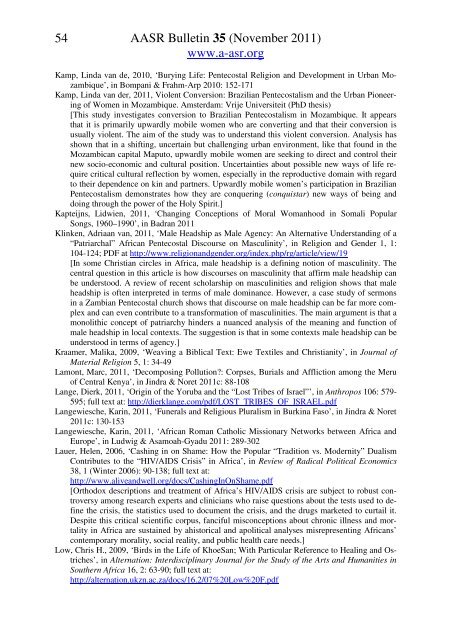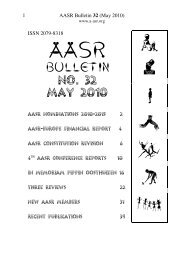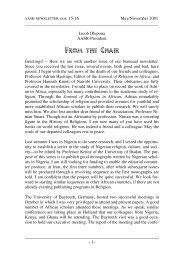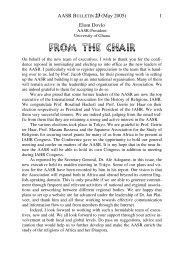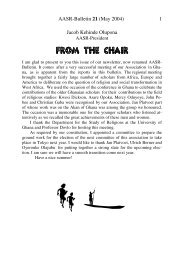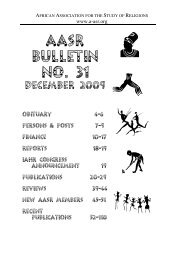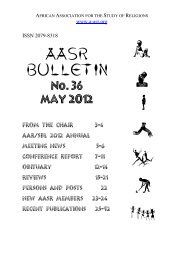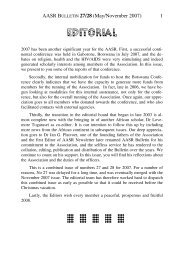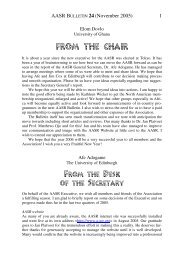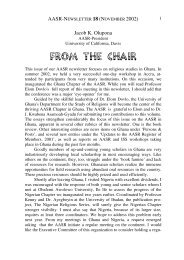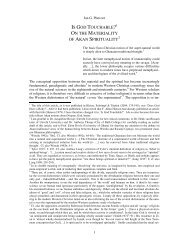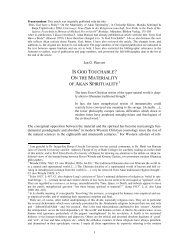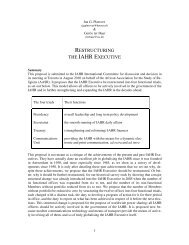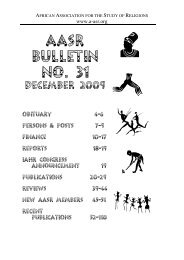AASR Bulletin 35 - The African Association for the Study of Religions
AASR Bulletin 35 - The African Association for the Study of Religions
AASR Bulletin 35 - The African Association for the Study of Religions
You also want an ePaper? Increase the reach of your titles
YUMPU automatically turns print PDFs into web optimized ePapers that Google loves.
54<br />
<strong>AASR</strong> <strong>Bulletin</strong> <strong>35</strong> (November 2011)<br />
www.a-asr.org<br />
Kamp, Linda van de, 2010, ‘Burying Life: Pentecostal Religion and Development in Urban Mozambique’,<br />
in Bompani & Frahm-Arp 2010: 152-171<br />
Kamp, Linda van der, 2011, Violent Conversion: Brazilian Pentecostalism and <strong>the</strong> Urban Pioneering<br />
<strong>of</strong> Women in Mozambique. Amsterdam: Vrije Universiteit (PhD <strong>the</strong>sis)<br />
[This study investigates conversion to Brazilian Pentecostalism in Mozambique. It appears<br />
that it is primarily upwardly mobile women who are converting and that <strong>the</strong>ir conversion is<br />
usually violent. <strong>The</strong> aim <strong>of</strong> <strong>the</strong> study was to understand this violent conversion. Analysis has<br />
shown that in a shifting, uncertain but challenging urban environment, like that found in <strong>the</strong><br />
Mozambican capital Maputo, upwardly mobile women are seeking to direct and control <strong>the</strong>ir<br />
new socio-economic and cultural position. Uncertainties about possible new ways <strong>of</strong> life require<br />
critical cultural reflection by women, especially in <strong>the</strong> reproductive domain with regard<br />
to <strong>the</strong>ir dependence on kin and partners. Upwardly mobile women’s participation in Brazilian<br />
Pentecostalism demonstrates how <strong>the</strong>y are conquering (conquistar) new ways <strong>of</strong> being and<br />
doing through <strong>the</strong> power <strong>of</strong> <strong>the</strong> Holy Spirit.]<br />
Kapteijns, Lidwien, 2011, ‘Changing Conceptions <strong>of</strong> Moral Womanhood in Somali Popular<br />
Songs, 1960–1990’, in Badran 2011<br />
Klinken, Adriaan van, 2011, ‘Male Headship as Male Agency: An Alternative Understanding <strong>of</strong> a<br />
“Patriarchal” <strong>African</strong> Pentecostal Discourse on Masculinity’, in Religion and Gender 1, 1:<br />
104-124; PDF at http://www.religionandgender.org/index.php/rg/article/view/19<br />
[In some Christian circles in Africa, male headship is a defining notion <strong>of</strong> masculinity. <strong>The</strong><br />
central question in this article is how discourses on masculinity that affirm male headship can<br />
be understood. A review <strong>of</strong> recent scholarship on masculinities and religion shows that male<br />
headship is <strong>of</strong>ten interpreted in terms <strong>of</strong> male dominance. However, a case study <strong>of</strong> sermons<br />
in a Zambian Pentecostal church shows that discourse on male headship can be far more complex<br />
and can even contribute to a trans<strong>for</strong>mation <strong>of</strong> masculinities. <strong>The</strong> main argument is that a<br />
monolithic concept <strong>of</strong> patriarchy hinders a nuanced analysis <strong>of</strong> <strong>the</strong> meaning and function <strong>of</strong><br />
male headship in local contexts. <strong>The</strong> suggestion is that in some contexts male headship can be<br />
understood in terms <strong>of</strong> agency.]<br />
Kraamer, Malika, 2009, ‘Weaving a Biblical Text: Ewe Textiles and Christianity’, in Journal <strong>of</strong><br />
Material Religion 5, 1: 34-49<br />
Lamont, Marc, 2011, ‘Decomposing Pollution: Corpses, Burials and Affliction among <strong>the</strong> Meru<br />
<strong>of</strong> Central Kenya’, in Jindra & Noret 2011c: 88-108<br />
Lange, Dierk, 2011, ‘Origin <strong>of</strong> <strong>the</strong> Yoruba and <strong>the</strong> “Lost Tribes <strong>of</strong> Israel”’, in Anthropos 106: 579-<br />
595; full text at: http://dierklange.com/pdf/LOST_TRIBES_OF_ISRAEL.pdf<br />
Langewiesche, Karin, 2011, ‘Funerals and Religious Pluralism in Burkina Faso’, in Jindra & Noret<br />
2011c: 130-153<br />
Langewiesche, Karin, 2011, ‘<strong>African</strong> Roman Catholic Missionary Networks between Africa and<br />
Europe’, in Ludwig & Asamoah-Gyadu 2011: 289-302<br />
Lauer, Helen, 2006, ‘Cashing in on Shame: How <strong>the</strong> Popular “Tradition vs. Modernity” Dualism<br />
Contributes to <strong>the</strong> “HIV/AIDS Crisis” in Africa’, in Review <strong>of</strong> Radical Political Economics<br />
38, 1 (Winter 2006): 90-138; full text at:<br />
http://www.aliveandwell.org/docs/CashingInOnShame.pdf<br />
[Orthodox descriptions and treatment <strong>of</strong> Africa’s HIV/AIDS crisis are subject to robust controversy<br />
among research experts and clinicians who raise questions about <strong>the</strong> tests used to define<br />
<strong>the</strong> crisis, <strong>the</strong> statistics used to document <strong>the</strong> crisis, and <strong>the</strong> drugs marketed to curtail it.<br />
Despite this critical scientific corpus, fanciful misconceptions about chronic illness and mortality<br />
in Africa are sustained by ahistorical and apolitical analyses misrepresenting <strong>African</strong>s’<br />
contemporary morality, social reality, and public health care needs.]<br />
Low, Chris H., 2009, ‘Birds in <strong>the</strong> Life <strong>of</strong> KhoeSan; With Particular Reference to Healing and Ostriches’,<br />
in Alternation: Interdisciplinary Journal <strong>for</strong> <strong>the</strong> <strong>Study</strong> <strong>of</strong> <strong>the</strong> Arts and Humanities in<br />
Sou<strong>the</strong>rn Africa 16, 2: 63-90; full text at:<br />
http://alternation.ukzn.ac.za/docs/16.2/07%20Low%20F.pdf


